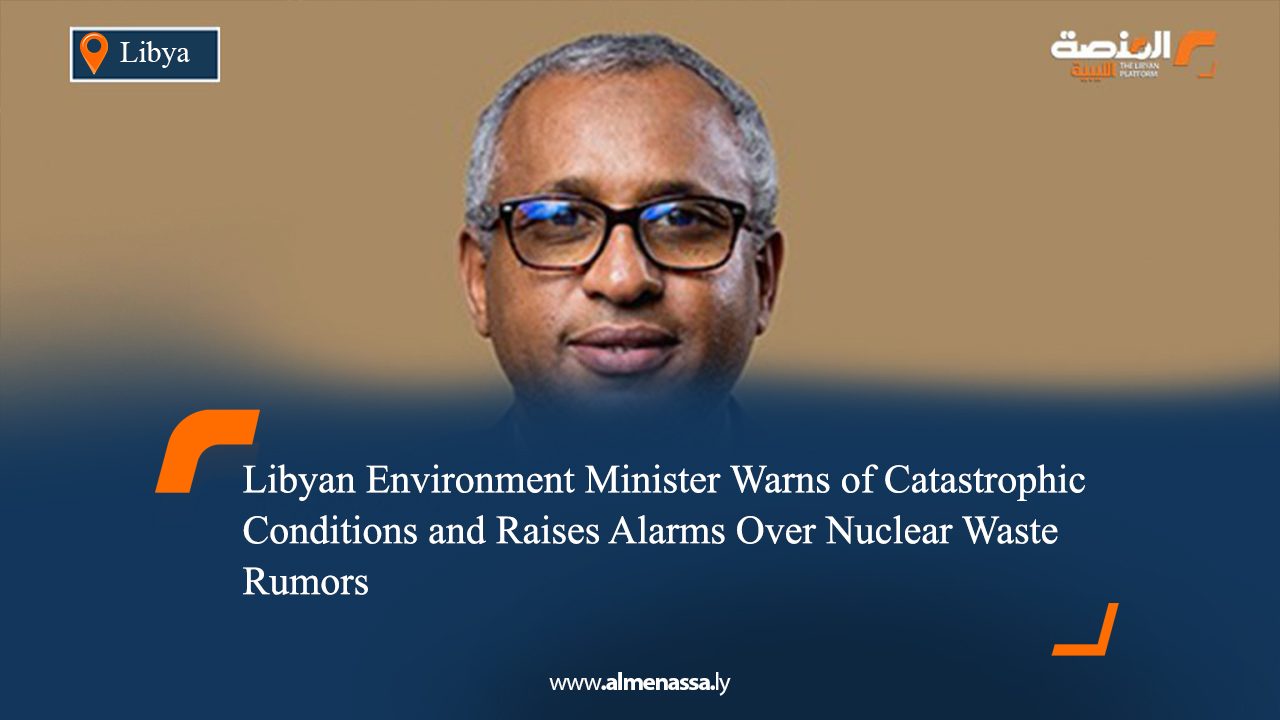Libya’s Minister of Environment, Ibrahim Al-Arabi, described the country’s environmental situation as “catastrophic,” attributing decades of neglect to successive governments that failed to prioritize ecological concerns. Despite the presence of environmental science programs in Libya for nearly fifty years and the graduation of qualified specialists, the sector has suffered from chronic underinvestment and disregard.
Widespread Pollution and Its Health Toll
Al-Arabi highlighted in an interview with the electronic newspaper Arabi21 the pervasive nature of pollution across Libyan households, citing hazardous waste such as medical refuse and industrial emissions. He linked this environmental degradation to rising rates of cancer and respiratory illnesses, stressing that pollution has become a public health crisis.
Biodiversity in Decline
Libya’s biodiversity has deteriorated sharply over the past thirty years, according to the minister. He pointed to widespread deforestation near Tripoli, Derna, and Al-Bayda, driven by illegal logging and unchecked urban sprawl. Wildlife populations have also been decimated by reckless hunting practices, including the use of military-grade weapons, night-vision scopes, and drones. Al-Arabi attributed this decline to ignorance and lack of awareness, calling for robust field teams to monitor Libya’s vast terrain—nearly two million square kilometers, equivalent to one-fifth of Europe’s landmass.
Water Scarcity and Climate Stress
Climate change has intensified desertification and water scarcity across Libya. Although the country possesses large groundwater reserves, many regions suffer from poor-quality drinking water or a complete lack of access. He emphasized that pollution remains the most urgent issue, directly affecting citizens’ health and quality of life. He noted that the Ministry of Environment has launched awareness campaigns and activated the environmental police, though limited resources have hampered progress over the past four years.
Climate Policy Stalled, Paris Agreement in Limbo
The climate change dossier, long shelved, has seen renewed attention under the current government. Libya’s Ministry of Environment adopted the Paris Agreement and submitted it to parliament for ratification four years ago, but it remains unapproved. The National Climate Committee is finalizing Libya’s first national report and emissions inventory, expected to be endorsed by the ministry within weeks. This will pave the way for Libya’s Nationally Determined Contributions (NDCs) under the Paris framework. Al-Arabi warned that Libya remains among the most vulnerable nations to climate impacts, citing water shortages and desert encroachment.
Nuclear Waste Allegations: No Confirmation, No Dismissal
Responding to rumors of nuclear waste burial off Libya’s coast, Al-Arabi said such claims fall under speculative propaganda but cannot be categorically denied. He explained that any radioactive contamination would eventually be detected by monitoring equipment. So far, joint efforts with the Radiation Measurement Center have found no evidence of concern. He added that transporting nuclear waste involves complex procedures under strict international oversight, and Libya’s porous borders since 2011 raise legitimate concerns about potential violations.
Cobra Release in Derna: Applauded but Poorly Coordinated
Al-Arabi praised the release of 72 cobras into Wadi Al-Naqa nature reserve near Derna by a local association, calling it commendable but lacking coordination with the ministry. He stressed the importance of expert input on release strategies and condemned indiscriminate killing of snakes, especially those living far from human settlements. While acknowledging that killing may be justified if snakes enter homes, he firmly opposed harming any animal without cause.
Governance Failures and Legal Gaps
Despite the dire environmental conditions, Al-Arabi criticized both past and present governments for failing to update Libya’s 20-year-old environmental law and for underfunding the sector. He argued that environmental degradation affects every domain—from health and education to infrastructure—and should be treated as a central issue in national policy.
No Significant U.S. Aid for Libya’s Environment
Al-Arabi denied reports of substantial U.S. environmental aid to Libya, stating that American contributions have been minimal and more symbolic than substantive. He noted that the U.S. has withdrawn from key climate agreements, including the Paris Accord, despite earlier pledges to support developing nations with billions in climate funding.
Security Breach Derails African Environment Summit
Libya was slated to host the 20th session of the African Ministers of Environment Council, but a security incident in Tripoli led to its relocation. Nevertheless, Libya retained the council presidency. Al-Arabi expressed hope that an extraordinary ministerial summit could be held later this year or early next, contingent on continued security improvements. He also hinted at a forthcoming Libyan initiative to be submitted to the council within six months.


